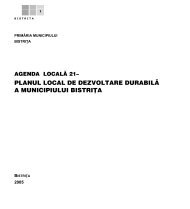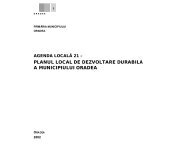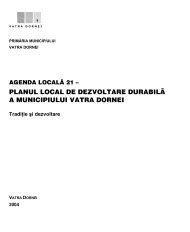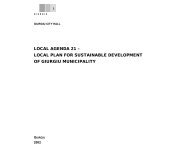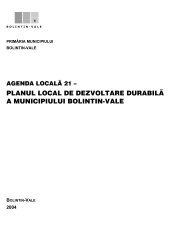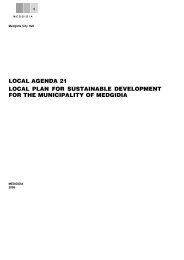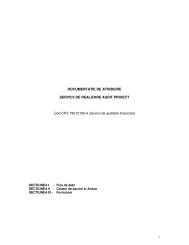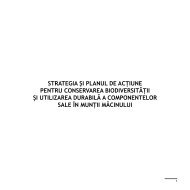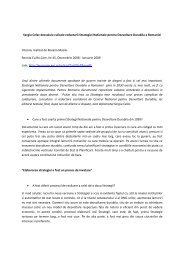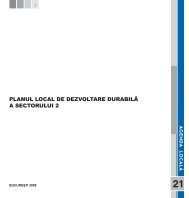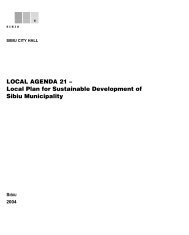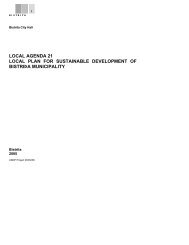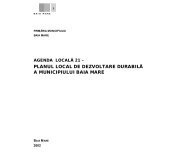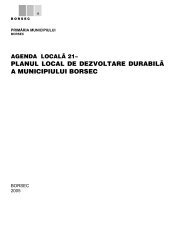English Version - United Nations Development Programme Romania
English Version - United Nations Development Programme Romania
English Version - United Nations Development Programme Romania
Create successful ePaper yourself
Turn your PDF publications into a flip-book with our unique Google optimized e-Paper software.
The following actions must be taken in order to achieve the above-mentioned goals:<br />
Identifying certain products and services, as well as markets that should be given priority, certain<br />
potential niches that will allow a faster integration of the <strong>Romania</strong>n exports into the global economy<br />
(based on mutual advantage);<br />
Implementation and completion of a coherent system of mechanisms and facilities (including<br />
government support) for the stimulation of exports;<br />
Creation of competitive conditions so as the <strong>Romania</strong>n exporters and their foreign competitors be<br />
placed on an equal footing;<br />
Further promotion of strategic alliances (national and international);<br />
Stimulating business partnerships in the public and private sector, as well as between the domestic<br />
and foreign sector;<br />
Renewal and re-negotiation of certain commercial bi- and multilateral agreements that could lead to<br />
exports in areas of special interest;<br />
Developing free trade zones and encouraging specific activities;<br />
Encouraging the export of highly processed products high added value, as opposed to the export of<br />
low added value products, raw materials and reusable waste. The tendency may be crated by using<br />
market instruments (fiscal and customs policies).<br />
Defining a legislative framework (a collection of regulations) that is coherent, stimulating, and stable<br />
for <strong>Romania</strong>n exporters and which should be compatible with international legislation in the field.<br />
Promoting the export of ecological products and services, making use of <strong>Romania</strong>'s comparative<br />
advantages over other countries.<br />
In order to make foreign trade policies become efficient tools in achieving economic growth,<br />
import policies must be aimed at the fundamental objective of creating a dynamic equilibrium of<br />
foreign trade, so that exports will be higher than imports. Here is a set of measures:<br />
Identifying and defining priorities in the structure of imports (by products, countries, areas);<br />
Evaluating the impact of imports on domestic producers and formulating certain trade protection<br />
measures that conform to rules and practices agreed upon internationally in those sectors in which the<br />
national economic policies require such treatment;<br />
Stimulating, by means of market incentives, those imports that contribute to an increase in exports;<br />
As long as they respect the international legal framework and practices in the particular field, and<br />
as long as they can be considered market tools rather than discriminatory administrative means, such<br />
measures are constructive economic (trade) policies aimed at prompting the economic development.<br />
However, the domestic market must be an important component in the process of economic<br />
growth, and the environmental protection must be included (in particular, regulations and norms<br />
regarding packing, labelling, storage of goods, perishableness, generation of waste, etc.).<br />
With all the progress achieved in internal trade (through the adoption of certain settlements), the<br />
domestic market must nevertheless evolve in the following respects:<br />
Developing the legal framework and the institutions needed for the creation of a unique domestic<br />
market (introduction and implementation of certain competition principles and practices, creating an<br />
institutional framework, integrating distribution licenses into a single informational system of the<br />
Commercial Register, harmonisation with international standards and norms). In this process of<br />
finalising legislation, the results of a permanent dialogue between professional and non-governmental<br />
organisations must be taken into account;<br />
Restructuring and modernisation of the distribution network (organising wholesale markets,<br />
promoting retail sales through modern networks of stores, increasing the technological standards of<br />
the distribution network);<br />
Monitoring competition, protecting the consumer, the environment, and quality of life (drawing up<br />
policies in this field, monitoring the market, and protecting consumers from abuses, by licensing<br />
merchants, harmonising consumer protection legislation with that of the E.U. countries);<br />
Increasing the general level of education and training in the distribution sector.<br />
Apart from specific measures that will improve internal commerce, a set of regulations is<br />
needed to improve business conditions in <strong>Romania</strong> and to develop the dome stic market.<br />
This includes the need to take certain measures that will re-open the domestic market for goods<br />
and services, for consumption, and for investments. This can be accomplished if the consumers' demand<br />
for goods and services stops declining and if demand continues to be stimulated (fiscal measures,<br />
encouraging the sale of goods by instalments, adopting certain national and regional infrastructure<br />
programmes).<br />
Domestic commercial policies could prioritise the generation of domestic demand for domestic<br />
products. Besides an increase in the quality of domestic products, which will automatically shift consumers'<br />
56



